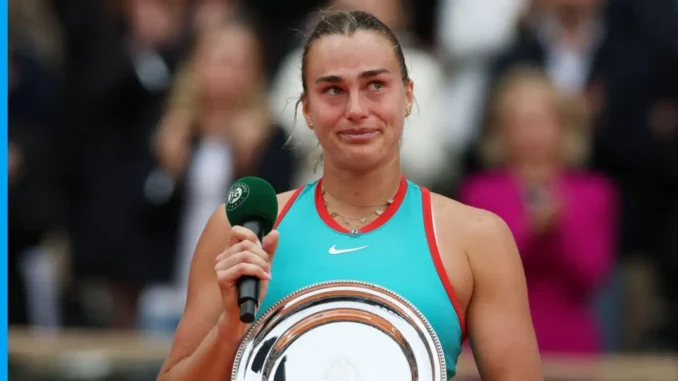
Aryna Sabalenka, the world’s No. 1 women’s tennis player, is still grappling with the fallout from her emotional outburst following her defeat to Coco Gauff in the 2025 Roland Garros final. The Belarusian star, known for her powerful game and candid personality, described the experience as “painful,” lamenting how a single moment of frustration overshadowed her character and achievements. Two months after the controversial press conference, as she prepares for the Cincinnati Open, Sabalenka remains haunted by the judgment that followed her remarks, which she now acknowledges were “completely unprofessional.”
The Roland Garros final was a grueling battle, with Sabalenka taking the first set in a tight tiebreak before Gauff mounted a stunning comeback, winning 6-7(5), 6-2, 6-4 to claim her second Grand Slam title. Sabalenka, who committed 70 unforced errors compared to Gauff’s 30, was visibly devastated. In the post-match press conference, her emotions boiled over. “I think she won the match not because she played incredible, just because I made all of those mistakes,” she said, adding that had Iga Swiatek reached the final, she believed Swiatek would have defeated Gauff. The comments, perceived as dismissive of Gauff’s achievement, sparked a firestorm of criticism, with fans and pundits, including former doubles champion Rennae Stubbs, calling them “classless” and “disrespectful.”
“It’s painful to see how, in the moment when you say something without thinking clearly, everyone judges you and completely forgets who you are and what you’ve done before,” Sabalenka reflected recently. The 27-year-old, a three-time Grand Slam champion, admitted that the intensity of competition clouded her judgment. “There are people who don’t understand the intensity we bring to competition. I went to the press very angry with myself and frustrated with the result,” she explained. The backlash was swift, prompting Sabalenka to write a heartfelt apology letter to Gauff, affirming her respect and acknowledging that Gauff “absolutely deserved to win the tournament.” The two reconciled, even sharing a lighthearted TikTok dance at Wimbledon to signal that the tension was behind them.
Sabalenka’s journey since Paris has been one of growth and self-reflection. “It took me a while to revisit it, to approach it with open eyes, and to understand. I realised a lot about myself. Why did I lose so many finals? I kept getting so emotional,” she said. The loss marked her second consecutive Grand Slam final defeat in 2025, following a three-set battle against Madison Keys at the Australian Open. Despite her 51 match wins and three titles this year, the sting of these high-stakes losses has pushed Sabalenka to confront her emotional responses. Her decision to skip the National Bank Open in Montreal to recharge mentally and physically underscores her focus on managing energy for the grueling season. “The season has been really intense; it’s impossible to be at my best every week,” she noted. “Now I feel much fresher physically and mentally.”
The Cincinnati Open, where Sabalenka is a top seed, offers a chance to reset before defending her US Open title. The draw, stacked with players like Gauff, Swiatek, and Emma Raducanu, promises fierce competition. Sabalenka’s comments in Paris also revealed her struggles with external factors, such as the windy conditions that she called “terrible.” “She was better in these conditions than me,” she said of Gauff, later regretting how her frustration overshadowed her opponent’s resilience. Gauff, gracious in response, dismissed the controversy, saying, “I understand what she was trying to say. It’s water under the bridge.”
Sabalenka’s candor, while divisive, is part of what makes her a compelling figure. Her raw emotion—evident in her screams of frustration, animated gestures, and occasional racket-smashing—endears her to some fans while alienating others. Yet, her willingness to learn from mistakes sets her apart. At Wimbledon, after losing to Amanda Anisimova in the semifinals, she jokingly assured reporters, “You’re not going to see the Roland Garros press conference,” signaling her intent to avoid repeating the Paris fiasco. “I just don’t want to face that hate again,” she said, emphasizing her efforts to stay composed.
As Sabalenka navigates the hard-court swing, her focus is on channeling her intensity into her game rather than her words. Her evolution from a high-risk, power-hitting player to a versatile all-court competitor—evident in her three Madrid Open titles and improved clay-court play—suggests she’s capable of overcoming setbacks. The Roland Garros outburst, though painful, has been a “tough but very valuable lesson,” teaching her the importance of respect and composure. With the US Open looming, Sabalenka is determined to let her racket do the talking, proving that she’s more than a moment of frustration—she’s a champion striving to reclaim her narrative.
Leave a Reply